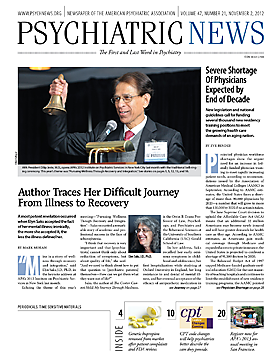Dilip V. Jeste, M.D.
APA’s primary mission is to help improve health care for people with mental illnesses. This cannot be accomplished without collaboration with advocacy groups that represent patients and their families. We share common goals: striving to assure provision of high-quality mental health services, advancing the cause of psychiatric research and training, and promoting general well-being.
APA has a long tradition of working with advocacy groups. This started with early lobbying for resources from federal and state governments and a close relationship with Dorothea Dix, a 19th-century activist who devoted her life to improving the care of impoverished persons with mental illness. One of the first advocacy groups that worked with APA was the National Association for the Protection of the Insane and the Prevention of Insanity, an organization formed in the 1880s to protest the harsh treatment given to institutionalized mentally ill people.
Today APA collaborates actively with several advocacy groups, including Mental Health America and the National Alliance on Mental Illness (NAMI), the nation’s largest grassroots mental health organizations dedicated to building better lives for the millions of Americans affected by mental illness.
APA maintains a close and fruitful advocacy relationship with these important nonprofit organizations. Together we have made countless visits to Capitol Hill to advocate for major programs such as the Mental Health Parity and Addiction Equity Act, which took many years to see the light of day. Other joint efforts include working on regulatory affairs, advocating for children’s issues, and emphasizing the need for stable, dedicated federal funding for research, treatment, and housing support for patients, as well as case-management services.
I invited Dr. Anand Pandya, president emeritus of NAMI, along with Keris Jan Myrick, president of NAMI, and Dr. Ken Duckworth, medical director of NAMI, to share their views on the collaboration between our organizations.
Anand Pandya, M.D., Keris Jan Myrick, and Ken Duckworth, M.D.
When NAMI was established in 1979, it was not obvious how valuable this energized movement would become for American psychiatry. NAMI was founded by family members of people with serious mental illness who had often experienced insensitivity when trying to get help for their loved ones. Their positions, often critical of flaws in the mental health care system, did not suggest a natural alliance with APA, which has its own roots as the Association of Medical Superintendents of American Institutions for the Insane, an organization that in many ways served as the only voice of the mental health care system.
Nonetheless, after three decades, NAMI and APA have witnessed a shift in the landscape of mental health care that has made them strong allies at the national level and increasingly at the state and local levels. NAMI has strategically expanded through outreach to diverse communities and has grown into a big tent that extends beyond family members to include individuals with mental illness and mental health professionals, bringing new meaning to our name as an “alliance.”
NAMI has helped psychiatrists to hear the differing perspectives of diverse stakeholders who are affected by its work. Along the way, there has been a growing recognition by all that while no one may be doing a perfect job in helping individuals with serious mental illness, we are all striving for this common goal.
At the state level, NAMI is often active in advocacy around state mental health budgets, which may provide one of the greatest opportunities for working relationships with APA district branches when our interests are aligned. NAMI’s presence in the states includes statewide organizations as well as many local affiliates. Throughout the country, these local NAMI affiliates provide family support groups, support groups for individuals with serious mental illness such as NAMI Connection, and psychoeducation through peer-led courses such as Family-to-Family, Peer-to-Peer, and NAMI Basics.
Family-to-Family is a 12-session course that has been taught to more than 300,000 family members of individuals with serious mental illness. In many parts of the United States, it is the main provider of family psychoeducation. Such education has the strongest level of evidence in improving outcomes for individuals with schizophrenia. Peer-to-Peer provides an experiential learning experience by and for people living with serious mental illness who are interested in maintaining their wellness and recovery. NAMI Basics teaches parents and other caregivers about how to meet the needs of children and adolescents living with mental illness.
At the national level, the NAMI Board of Directors and the APA Board of Trustees have already held a joint session, and the national staff of both organizations work closely together around a variety of issues such as advocating for funding of psychiatric research. NAMI’s national office produces a variety of reports designed to raise awareness of specific mental health issues. One recent special report, “Parity for Patriots,” makes vivid the broad scope of mental health needs for our military personnel, veterans, and their families. It recognizes the systemic challenges and barriers facing those who seek help, and it identifies a range of solutions. Notably, it calls for the Department of Defense to recognize the invisible wounds of our nation’s heroes by awarding the Purple Heart to those in the military who develop posttraumatic stress disorder or other serious mental illnesses as a result of hostile action.
With this broad range of resources, NAMI has become an essential ally to APA.
The time has come for all psychiatrists to join and become active in this powerful movement. APA members should consider joining their local NAMI affiliates or participating in one of the NAMIWalks held in more than 60 communities across the country to raise funds for advocacy and to increase awareness about mental illness.

Anand Pandya, M.D., is president emeritus of NAMI, Keris Jan Myrick is president of NAMI, and Kenneth Duckworth, M.D., is the medical director of NAMI .


